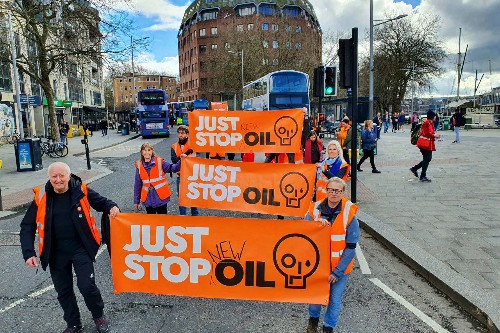Despite this prevailing negative sentiment, results showed the public generally think the most suitable punishment for disruptive, non-violent protesters is a fine or lesser penalty than imprisonment.
The research, led by the University of Bristol, suggests public opinion may not be supportive of the Government’s recent legislative changes, through The Public Order Act 2023, which introduce harsher sentences for disruptive protesters.
The online poll, conducted by YouGov this month, surveyed 2,069 adults of all political viewpoints across Britain. It showed an overwhelming 82% of respondents considered climate change to be either very or fairly important.
Overall, 29% of people listed the environment among the top three most important issues facing the country, although the economy (65%), health (42%) and immigration and asylum (36%) were the most popular choices. When asked separately about the importance of climate change, 52% of people said it was very important and 31% said it was fairly important, with only 14% saying it was not important.
However, 68% were found to disapprove of the Just Stop Oil group, which opposes the licensing and production of all new oil, gas, and coal projects – including 44% who held a very unfavourable opinion of the campaign.
Notwithstanding such views, more respondents (37%) thought the most appropriate punishment for people who participate in disruptive, non-violent protest, such as blocking a road, should be a fine as opposed to imprisonment (29%). Around one in seven (15%) didn’t think they should receive any punishment and a further 7% wanted protesters to be arrested with no further penalty.
This week the government announced it would grant hundreds of new North Sea oil and gas licences.
Research co-investigator Dr Oscar Berglund, Senior Lecturer in International Public and Social Policy, said: “High-profile politicians and sections of the media have sought to whip up public opinion against protest as a means to justify increasingly harsh sentences. These findings indicate the public majority are not persuaded of the need for prison sentences for protesters, perhaps because they recognise there is an important role for civil disobedience in liberal democracies.”
Respondents’ views were heavily influenced by their level of concern about climate change. Among the 29% who ranked the environment among the most important three issues facing Great Britain, only 13% advocate prison sentences for non-violent protesters causing disruption. By contrast, more than a third (36%) of those who didn’t consider the environment to be a top issue think imprisonment is the most appropriate punishment.
The poll also revealed mixed opinions about banning new oil and gas developments in Britain’s North Sea territory – a central demand of Just Stop Oil. Attitudes were highly polarised across political preferences: around half of those who voted Labour or Liberal Democrats in the 2019 general election support a ban (49% for Labour and 54% for Lib Dem voters) versus around a quarter who oppose a ban (26% for Labour and 27% for Lib Dem voters). Such preferences were reversed among Conservative voters, with 63% opposing a ban versus 16% in favour. Around 3 in 10 people (29%) are undecided.
Lead investigator Professor Colin Davis*, Chair in Cognitive Psychology at the University of Bristol, who is leading the research project, said: “Protester sentencing in the UK is a contentious issue. Over the last three years, a significant number of climate activists in the UK have been sent to prison, with some receiving sentences of up to three years. In total, more than 100 individuals engaged in non-violent climate-related protests have faced imprisonment, provoking varying degrees of public support and criticism.
“The findings of this research raise important questions about the government's approach to dealing with protest. It appears the public favours a more nuanced and balanced response that respects both the right to protest and the importance of maintaining social order.”
